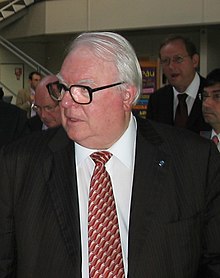Pierre Mauroy
| Pierre Mauroy | |
|---|---|
 |
|
| 106th Prime Minister of France | |
|
In office 22 May 1981 – 17 July 1984 |
|
| President | François Mitterrand |
| Preceded by | Raymond Barre |
| Succeeded by | Laurent Fabius |
| Mayor of Lille | |
|
In office 8 January 1973 – 25 March 2001 |
|
| Preceded by | Augustin Laurent |
| Succeeded by | Martine Aubry |
| First Secretary of the French Socialist Party | |
|
In office 1988–1991 |
|
| Preceded by | Lionel Jospin |
| Succeeded by | Laurent Fabius |
| President of the Socialist International | |
|
In office 1992–1999 |
|
| Preceded by | Willy Brandt |
| Succeeded by | António Guterres |
| Senator from Nord | |
|
In office 2 October 1992 – 30 September 2011 |
|
| Personal details | |
| Born |
5 July 1928 Cartignies, Nord, France |
| Died | 7 June 2013 (aged 84) Paris, France |
| Political party | Socialist |
| Occupation | Educator civil servant |
| Religion | Roman Catholic |
Pierre Mauroy (French: [pjɛʁ moʁwa]; 5 July 1928 – 7 June 2013) was a French Socialist politician who was Prime Minister of France from 1981 to 1984 under President François Mitterrand. Mauroy also served as Mayor of Lille from 1973 to 2001. At the time of his death Mauroy was the emeritus mayor of the city of Lille. He died from complications of lung cancer on June 7, 2013 at the age of 84.
Mauroy was born in Cartignies. A teacher, he led the Socialist Youth Movement and the Technical Teaching Union in the 1950s. He became a leading figure in the Socialist federation of Nord département, which was among the third biggest of the French Section of the Workers' International (SFIO) party and climbed quickly in the party. In 1966, he became the second most powerful person of the party behind the secretary general, Guy Mollet. Nevertheless, when Mollet resigned as leader in 1969, Alain Savary was chosen to succeed him.
After the electoral disasters of 1968 and 1969, he was persuaded of the necessity to renew the party. In 1971, during the Epinay Congress, he supported François Mitterrand's election to the party leadership and became the second most powerful person in the Socialist Party (PS). Two years later, he was elected as a deputy and Mayor of Lille.
Increasingly, Mauroy criticized the replacement of former SFIO members from important positions by allies of Mitterrand. In this, he formed an alliance with Michel Rocard, the main opponent of Mitterrand, during the 1979 Metz Congress. However, Mitterrand chose him as spokesperson during the 1981 presidential campaign; after Mitterrand's election, he appointed Mauroy as Prime Minister.
...
Wikipedia
